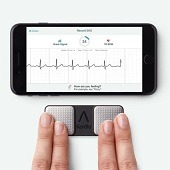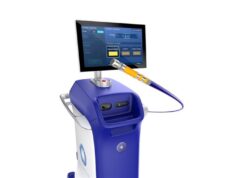 Researchers using artificial intelligence (AI) have determined that a smartphone-enabled mobile EKG device can accurately determine a patient’s QT. This can be used to identify patients at risk of sudden cardiac death from congenital long QT syndrome (LQTS) or drug-induced QT prolongation.
Researchers using artificial intelligence (AI) have determined that a smartphone-enabled mobile EKG device can accurately determine a patient’s QT. This can be used to identify patients at risk of sudden cardiac death from congenital long QT syndrome (LQTS) or drug-induced QT prolongation.
The research, conducted by clinicians from the Mayo Clinic (Rochester, USA), under the direction of Michael Ackerman, trained and validated an AI-based deep neural network to detect QTc prolongation using AliveCor’s KardiaMobile 6L EKG device. The findings of the study which were published in Circulation, compared the ability of an AI-enabled mobile EKG to a traditional 12-lead EKG in detecting QT prolongation.
“This collaborative effort with investigators from academia and industry has yielded what I call a ‘pivot’ discovery,” said Ackerman, who is director of Mayo Clinic’s Windland Smith Rice Comprehensive Sudden Cardiac Death Program. “Whereby, we will pivot from the old way that we have been obtaining the QTc to this new way. Since Einthoven’s first major EKG paper in 1903, 2021 will mark the new beginning for the QT interval.”
The team used more than 1.6 million 12-lead EKGs from over 500,000 patients to train and validate an AI-based deep neural network to recognise and accurately measure the QTc. This AI-based QTc assessment was tested prospectively on nearly 700 patients evaluated by Ackerman in Mayo Clinic’s Windland Smith Rice Genetic Heart Rhythm Clinic. Half of these patients had congenital long QT syndrome.
The object was to compare the QTc values from a 12-lead EKG to those from the prototype hand-held EKG device used with a smartphone. Both sets of EKGs were given at the same clinical visit, typically within five minutes of each other.
The study team found that the AI algorithm’s ability to recognise clinically meaningful QTc prolongation on a mobile EKG device was similar to the EKG assessments made by a trained QT expert and a commercial laboratory specialising in QTc measurements for drug studies. The mobile device effectively detected a QTc value of greater than or equal to 500 milliseconds, performing with 80% sensitivity and 94.4% specificity.
“The ability to equip mobile EKG devices with accurate AI-powered approaches capable of calculating accurately the QTc represents a potential paradigm shift regarding how and where the QT interval can be assessed,” said John Giudicessi, a Mayo Clinic cardiology fellow and first author of the study.
“Currently, AliveCor’s KardiaMobile 6L EKG device is FDA [US Food and Drug Administration]-cleared for detection of atrial fibrillation, bradycardia, and tachycardia. Once FDA clearance is received for this AI-based QTc assessment, we will have a true QT metre that can enable this emerging vital sign to be obtained easily and accurately,” says Ackerman. “Akin to a glucose metre for diabetics, for example, this QT metre will provide an early warning system, enabling patients with congenital or acquired LQTS to be identified and potentially lifesaving adjustments to their medications and electrolytes to be made.”
“This point-of-care application of artificial intelligence is massively scalable, since it is linked to a smartphone. It can save lives by telling a person that a specific medication may be harmful before he or she takes the first pill,” said Paul Friedman, chair of the Department of Cardiovascular Medicine at Mayo Clinic. ”This allows a potentially life threatening condition to be detected before symptoms are manifest.”
“Regularly monitoring for LQTS using KardiaMobile 6L allows for accurate, real-time data collection outside the walls of a hospital,” says David Albert, founder and chief medical officer at AliveCor. “Because LQTS can be intermittent and elusive, the ability to detect this rhythm abnormality without a 12-lead EKG—which requires the patient be in-hospital—can improve patient outcomes and save on hospital resources, while still providing the reliable and timely data physicians and their patients need.”
In other news, AliveCor has this week launched an expanded range of ECG determinations on its KardiaMobile devices. These new determinations are cleared by the USFDA as of November 2020 and include sinus rhythm with supraventricular ectopy (SVE), sinus rhythm with premature ventricular contractions (PVCs), and sinus rhythm with wide QRS.









